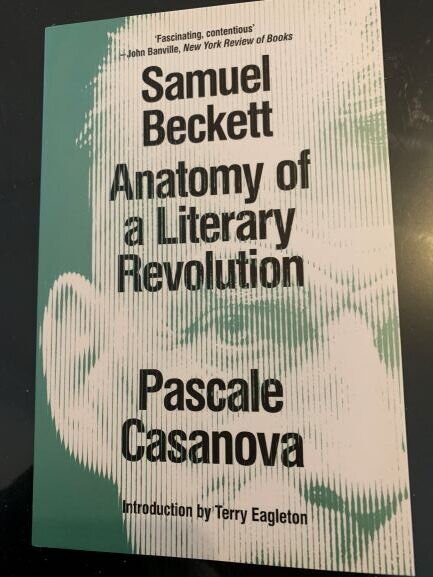I could lodge a score of complaints against Pascale Casanova’s appropriately brief, pungent study of Samuel Beckett, a book on quite a different scale from her renowned World Republic of Letters (1999; English translation, 2004), written under the aegis of Pierre Bourdieu. It’s not surprising, then, that this essay, published as Beckett L’abstracteur in 1997, then in English in 2006, and now reprinted in paperback, betrays some of the worst habits of the Bourdieuian frame of mind, above all a dogged determination to conquer scholastic supremacy by setting up straw-man ideological opponents to triumphantly demolish. For Casanova, the evil demon of Beckett interpretation was Maurice Blanchot, accused of promoting an existentializing account of the Irish author as “the messenger or oracle of the truth of ‘being,’” as the purveyor of “revelations about ‘man,’ the ‘world,’ ‘Being,’ ‘God,’ or ‘existence.’” This is, she says, “but one of the countless forms of literature’s annexation by philosophers”—never mind that after studying philosophy at university Blanchot never worked as anything other than a literary critic and novelist. Making thought and form an either/or, Casanova insists that only by attending to the formal constraints that Beckett little by little imposed on himself in a search for literary autonomy (which she sees reaching a pinnacle in 1983 with Worstward Ho, here carefully analyzed) can his work be properly understood, that is, as a way to “bring literature into modernity” as it had already been done in the plastic arts, namely via abstraction. But she does not seem to realize that what she rightly sees in Beckett’s work as “a prosaic metamorphosis” of certain philosophical ideas, their “novelistic secularization, restoring to abstract, elevated questions their quotidian banality,” is indeed a philosophical gesture; and to set out some of the literary means by which he accomplished this and explain by what circuitous route he arrived at those means is hardly to drain them of their content. Casanova’s is a self-contradictory enterprise: “By demonstrating the influence of history and the particular view of the world that derived from Beckett’s specific situation in the literary universe…I am seeking to show how his work was geared to tearing himself away from that particular history, to erasing all historical traces of his individual trajectory.” So that which was to be effaced must be reiterated in order to maintain the impact of its having been effaced! What a pickle. And yet I learned a lot from this book—for instance, about Beckett’s use of ideas from the seventeenth century Belgian “occasionalist” philosopher Arnold Geulincx (a follower of Descartes) and (of special interest to me) the importance of painting for the development of his writing. I have long been fascinated by Beckett’s art writing but had not until now understood its centrality to his enterprise. With the discovery that “it is necessary to paint what impedes painting” Beckett found the clue to a way of writing that would fulfill his early hope for “an assault against words in the name of beauty.” This thought was perhaps less distant than Casanova imagines from the intuitions of contemporaries such as, in fact, Blanchot, or in a very different way, some of the writers of the Oulipo group. And it had moreover been faced long before by Stéphane Mallarmé—the true literary revolutionary and inventor of literary abstraction, if one insists on a single origin, as Casanova might like to do—and, closer in time to Beckett, by Gertrude Stein. “What complicates it all,” Beckett told Lawrence Harvey, “is the need to make. Like a child in mud but no mud. And no child. Only need.” Sounds a bit like existence.
❂
Pascale Casanova, Samuel Beckett: Anatomy of a Literary Revolution, translated by Gregory Elliott, introduction by Terry Eagleton, is published by Verso, London and New York, 2020.
❂
BARRY SCHWABSKY is art critic for The Nation and co-editor of international reviews for Artforum. Along with many books on contemporary art, he’s published three books and several chapbooks of poetry as well as a collection of mainly literary criticism, Heretics of Language (Black Square Editions, 2017). His new book of poetry, A Feeling of And, will be published next year by Black Square.
